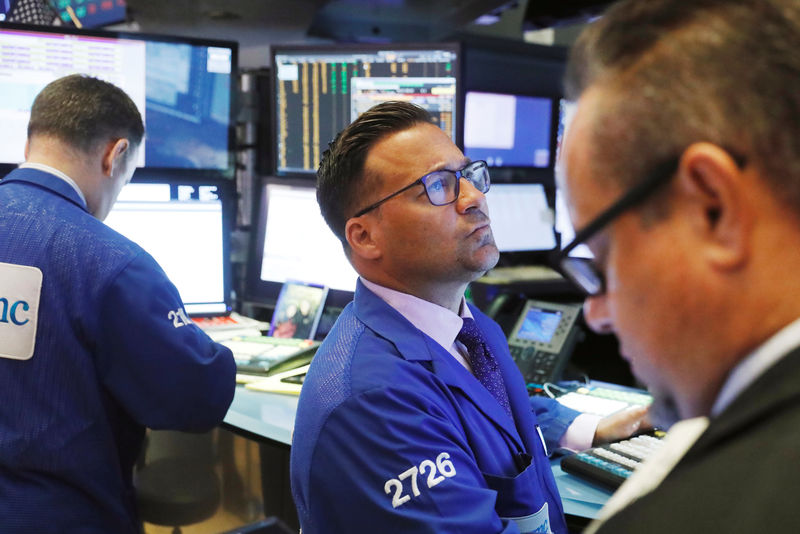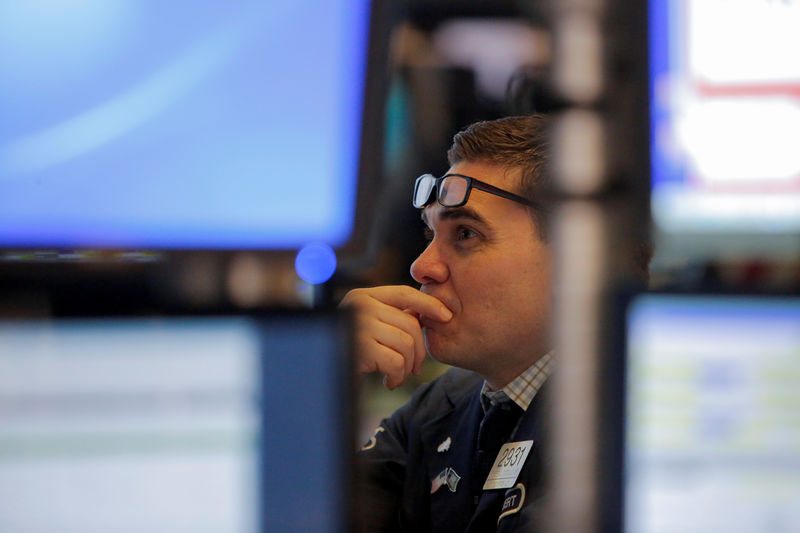By Sujata Rao and Helen Reid
LONDON (Reuters) - Investors are overweight U.S. equities for the first time in 15 months, Bank of America (NYSE:BAC) Merrill Lynch's latest monthly survey of funds showed on Tuesday, identifying global trade-war fears as a key factor hitting emerging market and European allocations.
The June survey of 235 participants managing a total of $684 billion showed that allocation to U.S. stocks rose 16 percentage points over the month to a net 1 percent overweight. Sixty-four percent of respondents thought U.S. companies had the best outlook for profits, the most in 17 years.
All other regions had negative profit outlooks.
The increased U.S. allocation came at the expense of emerging-market and European equities, BAML said, adding that survey respondents expected an average 9 percent upside to the U.S. S&P500 index from current levels (SPX).
"Investors have their eyes on the U.S. this month with a record high favorable outlook for profits and a return to U.S. equity allocation," Michael Hartnett, BAML's chief investment strategist, told clients.
For graphic on month-on-month changes to positioning click https://reut.rs/2JDG15P
That rise in U.S. allocation came even though so-called FAANG and BAT (LON:BATS) technology shares were identified as the most "crowded" trade for the fifth month in a row.
The FAANG category includes Facebook (O:FB), Apple (O:AAP), Amazon (O:AMZN), Netflix (O:NFLX) and Google (O:GOOGL). BATs refers to China's Baidu (O:BIDU), Alibaba (K:BABA) and Tencent (HK:0700)
The BAML survey has been fairly prescient in spotting which popular trades could be about to unravel, "short" dollar being the most recent example earlier this year.
Investors continued nevertheless to pile into tech, making the sector the biggest crowded trade since an overwhelming "long" dollar position in early 2017, BAML added.
Shorting U.S. Treasuries and going long on the dollar were the other two most crowded trades, at 16 percent and 9 percent respectively.
Meanwhile, allocation to commodities rose to a new eight-year high, with a net 7 percent overweight.
GRAPHIC - Tail risks : https://reut.rs/2JwGkDG
TRADE WAR FEARS PREY
There was no shortage of worries, however: cash holdings were 4.8 percent, above 10-year averages. Markets have been pressured by the prospect of increased U.S. tariffs on imports and also by politics in Italy, where two anti-establishment parties have formed a coalition government.
Survey participants' most commonly cited tail risk was trade war, identified by 31 percent of respondents. Twenty-six percent cited a hawkish policy mistake by the U.S. Federal Reserve or the European Central Bank. Another 23 percent cited the risk of an emerging-market or euro debt crisis.
For graphic on European autos earnings growth expectations click https://reut.rs/2JBTMSE
The Fed and the ECB both meet this week. The former is expected to raise interest rates; the latter to signal the timing of an exit from its stimulus program.
With rates rising, concerns are also growing about corporate debt. A record-high net 32 percent of polled money managers considered balance sheets over-leveraged.
"June rotation shows investors are selling cyclical plays (such as) banks, emerging markets and euro zone equities in favor of defensive sectors and U.S. equities," BAML said.
Investors retained their European equity overweight but cut allocations to 18-month lows, citing trade-war fears and slower growth.
Among European funds, the trade threat drove the biggest- ever drop in allocations to auto stocks in the history of the poll, reflecting growing anxiety about potential U.S. tariffs on carmakers, the majority of which are listed in Europe.
Positioning fell in June to its lowest in seven years, down to a net 15 percent underweight from a net 21 percent overweight last month. Banks were also cut to a net 3 percent underweight, with positioning down 20 percent from January peaks.
European funds' sentiment about their region's growth also reached its lowest ebb since the Brexit vote two years ago, according to the poll. A net 9 percent of European fund managers saw Europe's economy weakening over the next 12 months.
The market has flatlined in 2018, with a pan-European index (STOXX) down 0.3 percent year-to-date. Auto stocks (SXAP) such as Daimler, BMW and Volkswagen (DE:VOWG_p) have been especially vulnerable to trade tensions, having drawn the ire of U.S. President Donald Trump. Their expected earnings growth has slowed over the past year.

U.S. stocks, on the other hand, are up 4 percent this year, after robust economic growth and large corporate tax cuts.
